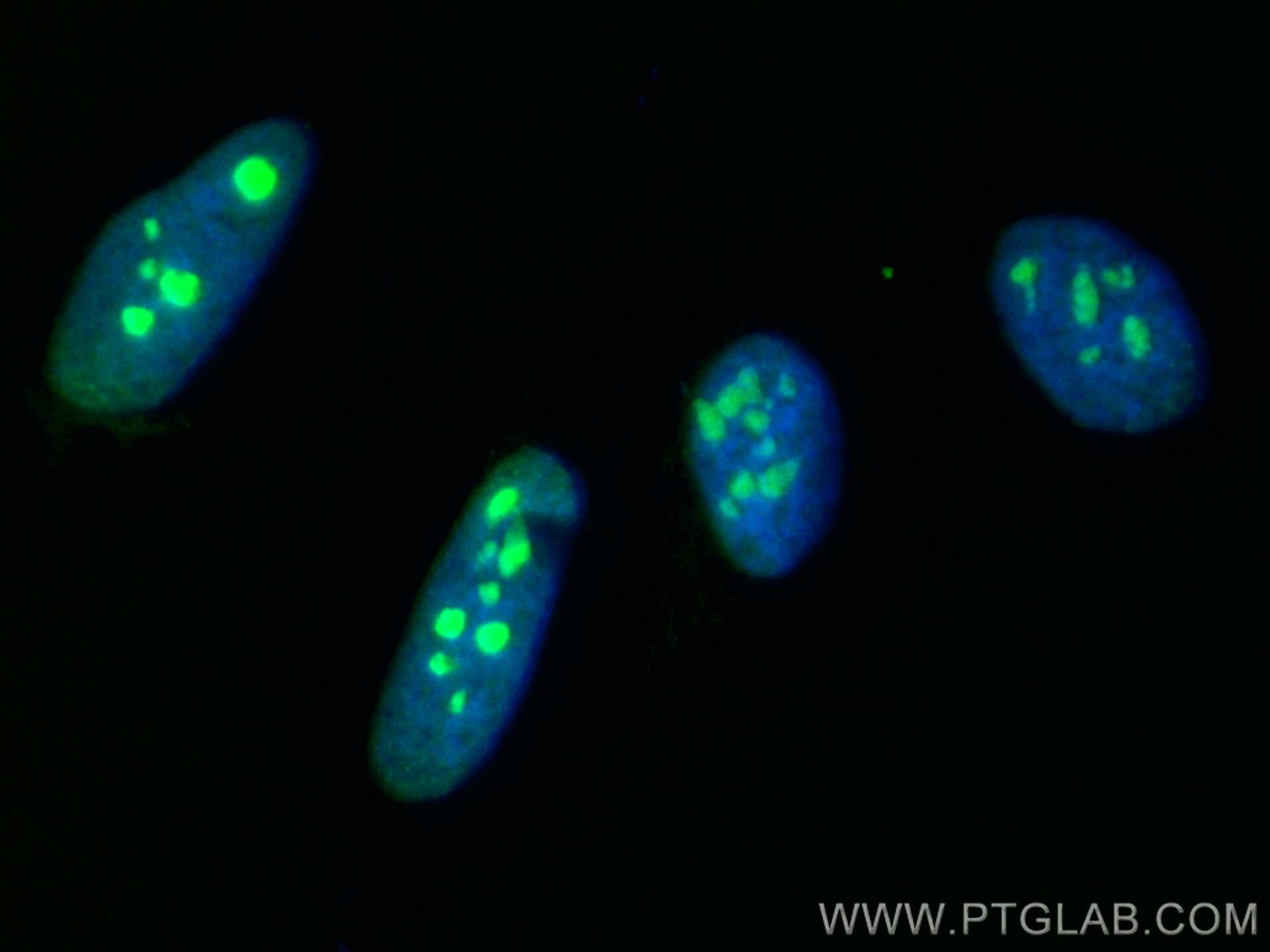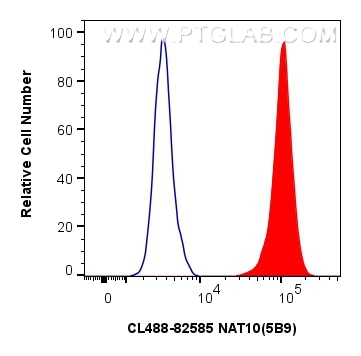Anticorps Recombinant de lapin anti-NAT10
NAT10 Recombinant Antibody for IF/ICC, FC (Intra)
Hôte / Isotype
Lapin / IgG
Réactivité testée
Humain
Applications
IF/ICC, FC (Intra)
Conjugaison
CoraLite® Plus 488 Fluorescent Dye
CloneNo.
5B9
N° de cat : CL488-82585
Synonymes
Galerie de données de validation
Applications testées
| Résultats positifs en IF/ICC | cellules HeLa, |
| Résultats positifs en FC (Intra) | cellules HeLa, |
Dilution recommandée
| Application | Dilution |
|---|---|
| Immunofluorescence (IF)/ICC | IF/ICC : 1:400-1:1600 |
| Flow Cytometry (FC) (INTRA) | FC (INTRA) : 0.40 ug per 10^6 cells in a 100 µl suspension |
| It is recommended that this reagent should be titrated in each testing system to obtain optimal results. | |
| Sample-dependent, check data in validation data gallery | |
Informations sur le produit
CL488-82585 cible NAT10 dans les applications de IF/ICC, FC (Intra) et montre une réactivité avec des échantillons Humain
| Réactivité | Humain |
| Hôte / Isotype | Lapin / IgG |
| Clonalité | Recombinant |
| Type | Anticorps |
| Immunogène | NAT10 Protéine recombinante Ag4184 |
| Nom complet | N-acetyltransferase 10 (GCN5-related) |
| Masse moléculaire calculée | 1025 aa, 116 kDa |
| Poids moléculaire observé | 116 kDa |
| Numéro d’acquisition GenBank | BC035558 |
| Symbole du gène | NAT10 |
| Identification du gène (NCBI) | 55226 |
| Conjugaison | CoraLite® Plus 488 Fluorescent Dye |
| Excitation/Emission maxima wavelengths | 493 nm / 522 nm |
| Forme | Liquide |
| Méthode de purification | Purification par protéine A |
| Tampon de stockage | PBS with 50% glycerol, 0.05% Proclin300, 0.5% BSA |
| Conditions de stockage | Stocker à -20 °C. Éviter toute exposition à la lumière. Stable pendant un an après l'expédition. L'aliquotage n'est pas nécessaire pour le stockage à -20oC Les 20ul contiennent 0,1% de BSA. |
Informations générales
NAT10 (N-acetyltransferase 10) is a nucleolar protein that is involved in regulation of telomerase activity, DNA damage response, and cytokinesis. It also plays a role in maintaining nuclear shape. Inhibition of NAT10 has been reported to rescue the misshapen nuclei in laminopathic cells via microtubule reorganization. The specificity of this antibody has been tested by siRNA (PMID: 24786082). NAT10 regulates mitotic cell fate by acetylating Eg5. NAT10 depletion results in multinuclear giant cells, which is the hallmark of mitotic catastrophe (PMID: 35210604). NAT10 plays a crucial role in carcinogenesis through influencing EMT, hypoxia, ribosomal biogenesis and overall, promoting translational efficiency. Recently, we reported that treating cancer cells with Remodelin, a small molecule inhibitor of NAT10, causes alteration in global lipid metabolism (PMID: 36149760).
Protocole
| Product Specific Protocols | |
|---|---|
| IF protocol for CL Plus 488 NAT10 antibody CL488-82585 | Download protocol |
| FC protocol for CL Plus 488 NAT10 antibody CL488-82585 | Download protocol |
| Standard Protocols | |
|---|---|
| Click here to view our Standard Protocols |



